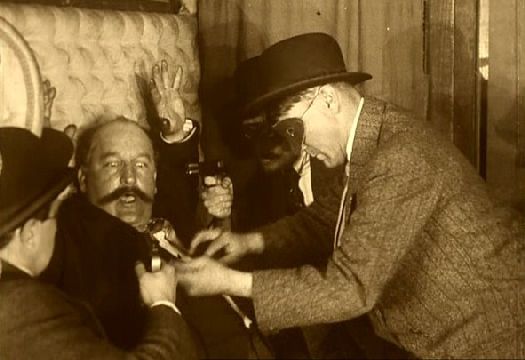Juve contre Fantômas (1913) 

Juve contre Fantômas (1913)
Director: Louis Feuillade
Cast: René Navarre, Edmund Breon, Georges Melchior
Synopsis: The master criminal Fantômas is pursued by the intrepid Inspector Juve and his sidekick, the journalist Jérôme Fandor
False beards abound in Juve contre Fantomas, the second batch of four episodes in the serial based on the phenomenally popular novels of Pierre Souvestre and Marcel Allain. They contribute to a number of unintentionally funny aspects of an otherwise impressively sophisticated series in which the arch-criminal Fantomas (Rene Navarre) engages in a battle of wits with police detective Inspector Juve (Edmund Breon – A Yank at Oxford, The Thing from Another World). Not only do we have fake beards, but fake arms as well, which the ever-resourceful Fantomas utilises to shake free of the iron grip of Juve and his sidekick, the journalist Fandor (Georges Melchior) on the one fleeting moment when they have him in their grasp. Another scene, in which an assortment of bad guys pops up from behind a load of overturned barrels like figures in a Whack-It game to take pot shots at our heroes, is also more likely to provoke laughter rather than the thrills that were no doubt originally intended.
Fantomas is a surprisingly ruthless criminal – in fact that ruthlessness, and his fondness for fake body parts, are his only defining characteristics; he engineers a train crash which he knows will result in the likely deaths of most of its passengers merely to get his hands on a sum of money being transported by a wine merchant. When his plan works, he’s disgruntled to discover that the notes had all been cut in half as part of a business contract which stipulated that the rest would be delivered upon completion of the contract. He decides to visit the office of the wine merchant to retrieve the other note halves, thereby giving Juve a chance to lay a trap for him.
While the story structure and look of the Fantomas movies is unusually sophisticated for its era, they undoubtedly impress far less today if they’re watched without taking the year of their production into consideration. Coming from an age when villains were hypnotic individuals superior to most ordinary people – rather than desperate low-lifes – means that the plots are far-fetched and melodramatic by modern standards. The movie does come alive when it takes to the streets of Paris, however, adding a real evocative flavour to these scenes of a beautiful city that was yet to experience the ravages of two World Wars.
(Reviewed 18th April 2015)
httpv://www.youtube.com/watch?v=gTWccq8xn_w

